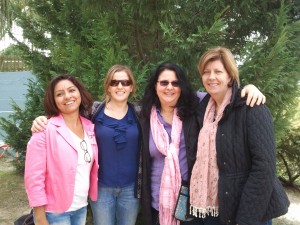“Bad libraries only build collections. Good libraries build services (and a collection is only one of many). Great libraries build communities”, (Lankes, 2012, p. 33). Having almost completed this course I want to expand on this statement – great libraries not only build communities but they are built by communities. Community involvement in the library services, creating the collection, reflecting on the policies and participating in procedures places the ownership of the library right where it should be – in the hands of the people it serves.
Our library serves the staff, students and families of Istanbul International Community School. When we were considering budgeting for a balanced collection we were asked how realistic is it to use output measures e.g. use of resources as a basis for library budgets? I wondered whether instead of measuring resource use we look at the range of people using the resources (Bond, 2014a). Many of our students borrow DVDs for family fun nights. Parents come in and borrow resources for themselves, for younger children not at school yet and to supplement the resources their children borrow. Our whole school community uses our library collection and they should have a say in its development.
When I was reading about weeding it was suggested to involve colleagues and students in that process (Beilharz, 2006, n.p.). I must admit I cringed. My colleagues can be very critical of getting rid of resources no matter how tatty and irrelevant, and I had never asked students before. I had the chance to try working with a student that week. Anna age 5 understood our criteria and purpose and made great decisions on the resources (Bond, 2014c). That experience really did show me the value of including the community in collection management.
Consultation is time consuming so it has to be focussed. When we considered collection evaluation and its importance in showing where to place precious funds in order to maximize learning impact the time factor seemed the biggest barrier (Hughes-Hassell & Mancall, 2005, p.40). A focussed evaluation of one area can be achieved in limited time. Our International Languages collection, otherwise known as Mother Tongue books, certainly is one area in need of evaluation. Our school has many students who are learning in English language but for whom English is not their first language. Research is showing that the more years of education they have in their first language the better the students are at this language and the target (in our case, English) language (Skutnabb-Kangas & Phillipson, 2009). Our collection has been built around parent donations. I am only fluent in English language and so I need to consult with our community. I will need to create an evaluation guide for parent or student volunteers (Bond, 2014b) and then we can plan to develop this collection effectively together.
One of the enduring understandings I have from this course is that the collection is vital for the effective support of the teaching and learning in our school community AND the community has to contribute to collection’s vitality. For the people, by the people – this is what makes great library collections and great libraries.
References
Beilharz, R. (2006). Secret library business – part 2. Connections, 63. Retrieved from http://www2.curriculum.edu.au/scis/connections/issue_63/secret_library_business__part_2.html
Bond, A. (2014, April 1). Other techniques for collection measurement [Online forum post]. Retrieved from http://forums.csu.edu.au/perl/forums.pl?forum_id=ETL503_201430_W_D_Sub6_forum
Bond, A. (2014, May 4). Evaluation – making time for learning excellence [Blog post]. Retrieved from Wondering at work website: https://abond.edublogs.org/2014/05/04/evaluation-making-time-for-learning-excellence/
Bond, A. (2014, May 17). A prickly problem [Blog post]. Retrieved from Wondering at work website: https://abond.edublogs.org/2014/05/17/a-prickly-problem/
Hughes-Hassell, S., & Mancall, J. C. (2005). Collection management for youth: responding to the need. Chicago: ALA editions.
Lankes, R. D. (2013). Expect more: Demanding better libraries for today’s complex world. San Bernadino, CA: R. David Lankes.
Skutnabb-Kangas, T., Prof., & Phillipson, R., Prof. (2009, January). The language is the learning (Interview by C. Inugai-Dixon & A. Flory) [Transcript]. Retrieved May 4, 2014, from International Baccalaureate Organisation website: http://www.ibo.org/ibworld/jan09/languageisthelearning.cfm

